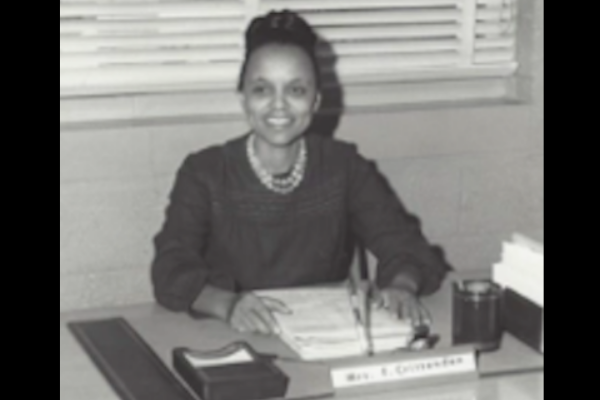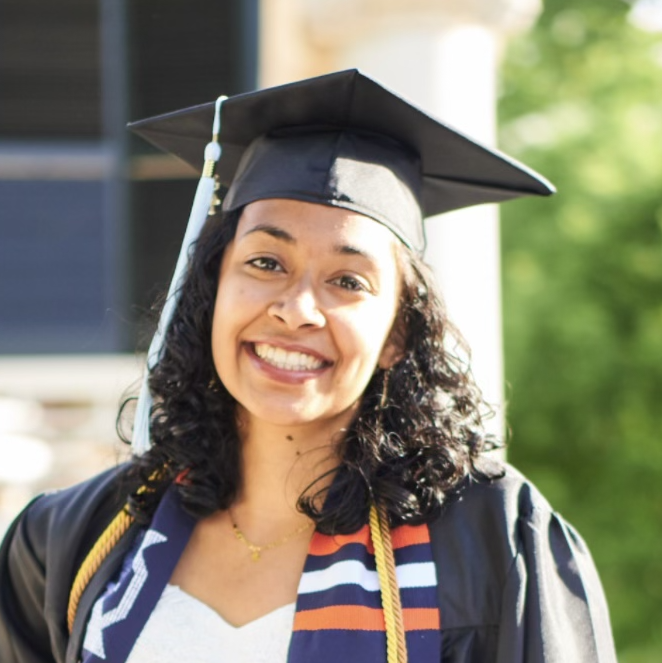By: Celina Adams
Highlights:
- In spring 2021 I worked with the Teachers in the Movement project during my final semester as an undergraduate.
- During this time, I reviewed and conducted oral history interviews that explored teachers’ ideas and pedagogy inside and outside the classroom during the U.S. Civil Rights Movement.
- In this original blog post, I reviewed an interview with Mrs. Flora Crittenden and reflected on the power of intergenerational activism.

Mrs. Flora Crittenden is a remarkable woman who positively impacted her students and community throughout her lifetime. She worked as an educator, guidance counselor, and politician during the Civil Rights Movement. Her incredibly deep involvement in her community speaks to her determination to facilitate racial justice in every aspect of life. I reviewed an oral history interview from Mrs. Crittenden during my involvement with the Teachers in the Movement Project, and a major theme that arose in the discussion of her career is the importance of support systems. This yielded intergenerational progress that is evident in the lives of Mrs. Crittenden, her family members, and her students.
Role Models & Background
While attending the only school that accepted Black students in her county in Newport News, Huntington High School, Mrs. Crittenden interacted with teachers who maintained high standards for her. This high school was established around 1920 with the intention of providing quality education to African American students, and in Mrs. Crittenden’s experience, it did exactly that. Mrs. Crittenden specifically recalls the impact her high school biology and chemistry teacher, Mr. Hines, had on her. While in his class, she was assigned projects that she found uninteresting. She was determined not to complete her assignments; however, Mr. Hines pushed her to conduct the necessary research. Mrs. Crittenden believes that educators like him were the reason she attended college and excelled academically. Mr. Hines was one of the many resources Huntington High School afforded Mrs. Crittenden, and his impact in her life extended beyond his classroom. Years after she graduated, Mr. Hinesbecame the principal of George Washington Carver High School which is located in Newport News. He alone was responsible for the school’s opening and operations due to the lack of resources provided by the School Board. As a result, he recruited Mrs. Crittenden to help develop the school’s curriculum and hire faculty. Mr. Hines garnered her support prior to the school’s unveiling in 1949. He went to her home, and he said “Mrs. Crittenden, get dressed—we got to go make a school.” This simple statement coupled with his guidance radically affected Mrs. Crittenden’s life. It gave her the opportunity to invest in a school in a way that most teachers are unable to do.
Educating during the Civil Rights Movement
Even though the subject matter Mrs. Crittenden taught (girls’ physical education and occasionally biology) did not easily align with the ideas promoted by the Civil Rights Movement, Mrs. Crittenden made an effort to remind her students that they were valued, citizens. She wanted them to know that neither their age nor race made them inferior to anyone. Mrs. Crittenden worked predominantly with young women since “physical education classes were separated by gender but not the academic classes.” It was not until 1972 that all classes were required to be coeducational as a result of Title XI. Therefore, the majority of Mrs. Crittenden’s students had to navigate a society that praised whiteness and masculinity. This challenging situation made the affirming messages Mrs. Crittenden taught increasingly necessary. Additionally, she encouraged her students to be an active member of their communities despite social norms. This approach was rooted in her belief that:
Educational institutions have the ability to strengthen both families and nations by producing educated and thoughtful citizens.
Mrs. Crittenden was determined to ingrain these ideals in her students. Her teaching style suggests that activism can occur in any environment. It is not limited to certain subject matter, locations, or age groups. She suggests that “it just so happened that [she] was a teacher” who used her career as a platform to promote Civil Rights. Mrs. Crittenden’s work suggests that activism is rooted in an understanding of the humanity of people.
Life Beyond Teaching
Mrs. Crittenden sought opportunities to enact change in the lives of young people and community members beyond teaching. This led to her decision to become a guidance counselor. This new position allowed her to counsel students in a more personalized manner; she could tailor her approach to individual students rather than classrooms with multiple people. Mrs. Crittenden was invested in the lives of her students. Furthermore, she was able to engage directly with students and parents creating an environment that fostered student success. Thursa Crittenden, Mrs. Crittenden’s daughter, recalled an experience in which a student received a scholarship to an excellent university, but he did not want to attend that institution. Mrs. Flora Crittenden knew the school would afford him numerous opportunities, so she traveled to the students’ homes to speak to his parents and compel him to accept the university’s offer. He ultimately decided to attend the university, and he attributes his success to Mrs. Crittenden’s persistence. This situation highlights Mrs. Crittenden’s deep desire to support her students.
Read more in the original blog post on how Mrs. Crittenden’s family shaped her view of education and ultimately led to her deep appreciation of teaching, her educational background, her life after retiring from teaching which include becoming a representative for the Virginia House of Delegates, and references.
If you have any comments or questions about this post, please email Youth-Nex@virginia.edu. Please visit the Youth-Nex Homepage for up to date information about the work happening at the center.

Author Bio: Celina Adams recently received a Bachelors of Science in Education in May 2021 from the University of Virginia. She double majored in Youth in Social Innovations and American Studies. She currently works on the Counseling and Equity team at ReadyKids, a local nonprofit that provides educational, developmental, and counseling support to children and families. This position embodies Celina’s interests in racial justice, culture, and mental health. She hopes to continue her studies in order to learn how to highlight the stories of marginalized people and promote positive racial identity development.
